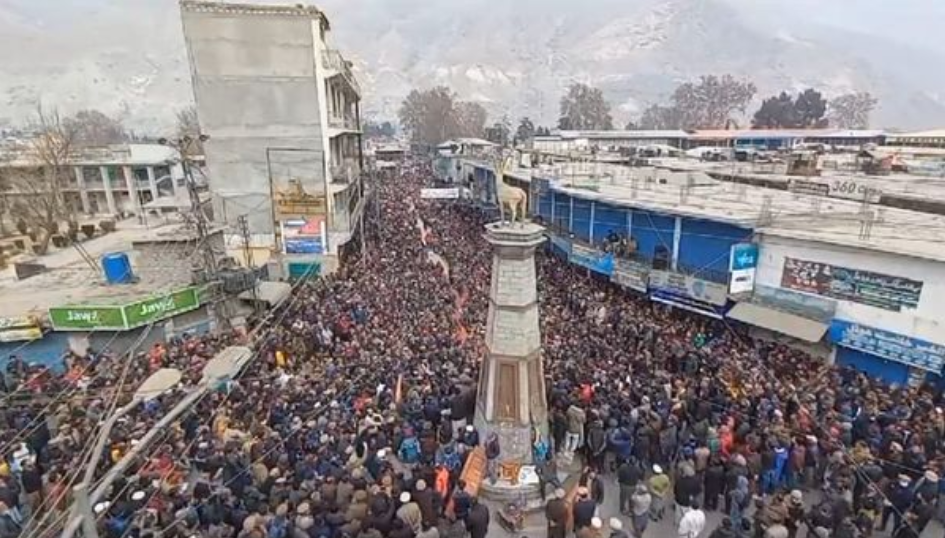GB’s Price Hike Rollback, But Protests Persist
News Desk
Islamabad: Following negotiations between the Gilgit-Baltistan (GB) government and the People’s Action Committee (PAC), the government has issued a notification signalling the withdrawal of the proposed price increase.
However, the People’s Action Committee (PAC) hinted that the ongoing protest and shutter-down strike will persist until the government addresses all 15 demands put forth by the committee.
The decision to reduce the prices was made keeping in mind the low purchasing power of the public, notification states.
According to local sources, people in GB are grappling with persistent socioeconomic challenges, encompassing issues such as poverty, unemployment, restricted higher education opportunities, electricity load shedding, insufficient infrastructure, and the looming threat of terrorism. Following the multifaceted challenges, GB residents under the banner of the Awami Action Committee (AAC) launched a protest demonstration in favour of their 15-point charter of demand in Gilgit.
Following the multifaceted challenges, GB residents under the banner of the Awami Action Committee (AAC) launched a protest demonstration in favour of their 15-point charter of demand in Gilgit.
The charter of demand includes the establishment of Medical and Engineering College, the restoration of subsidised wheat prices, the suspension of the Finance Act 2023, the elimination of taxes on G-B residents, the resolution of the electricity crisis, and the assurance of G-B’s share in the NFC award, among other things.
The local sources said that the entire GB cabinet remained in Islamabad during the ongoing protest. Due to the ignoring attitude of the GB government, protests gained momentum and grown across GB.
The weeks long protests witnessed rallies of thousands from the Nagar, Hunza, and Ghizer districts toward Gilgit city where the wheel-jam and shutter-down strikes commenced and thousands of protesters showed up.
GB’s Uphill Struggles
The political landscape in Gilgit-Baltistan underwent a transformation, particularly with Chief Minister Gulbar Khan assuming office following the disqualification of CM Khalid Khursheed in July 2023.
Despite a diverse cabinet inclusive of ministers from different political parties such as PTI, PPP, PML-N, and JUI-F, forging a constructive working relationship with the federal government has posed difficulties, adversely affecting policy implementation and overall governance.
Maintaining law and order has emerged as a pressing concern, as evidenced by recent events such as the heinous murder of a teacher and a police SHO in Ghizer District. Astonishingly, the Speaker of the Assembly asserted awareness of the perpetrators, but arrests have not been executed.
Acts of terrorism, exemplified by the shooting on a passenger bus in District Diamer, resulting in the tragic demise of 12 innocent individuals, underscore the precarious security situation. Notably, a bomb was recently discovered planted beneath the twin bridges near the CPO Office in Gilgit.
Persistent socioeconomic issues continue to plague Gilgit-Baltistan, including poverty, unemployment, limited higher education opportunities, electricity load shedding, inadequate infrastructure, and terrorism.
The educational deficit in Gilgit-Baltistan is stark, with only two universities for higher education facing financial issues and corruption allegations. The absence of medical and engineering colleges further limits opportunities for the youth, hindering overall development.
Following the challenges faced by the natives, Gilgit-Baltistan witnessed historic protests across all the districts.
For the last 30 days, people in GB have been protesting against the government’s decision. Protestors from various districts like Hunza, Nagar, Diamer, Ghizer, Shigar, and Kharmang started heading towards the main protests present at Yadgar-e-Shuhda Skardu and Itehad Chowk Garibagh, Gilgit.
The report is compiled with additional information sourced from Media Lens and Worldroof Media.
Photo Credit: Shabbir Mir

Comments are closed.